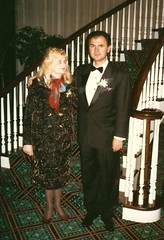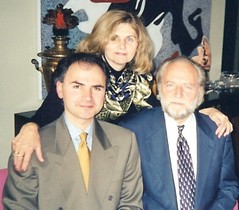Blog Archives
Do Not Go Gentle Into That Good Night
By Dylan Thomas
Do not go gentle into that good night,
Old age should burn and rave at close of day;
Rage, rage against the dying of the light.
Though wise men at their end know dark is right,
Because their words had forked no lightning they
Do not go gentle into that good night.
Good men, the last wave by, crying how bright
Their frail deeds might have danced in a green bay,
Rage, rage against the dying of the light.
Wild men who caught and sang the sun in flight,
And learn, too late, they grieved it on its way,
Do not go gentle into that good night.
Grave men, near death, who see with blinding sight
Blind eyes could blaze like meteors and be gay,
Rage, rage against the dying of the light.
And you, my father, there on the sad height,
Curse, bless, me now with your fierce tears, I pray.
Do not go gentle into that good night.
Rage, rage against the dying of the light.
 |
| Dylan Thomas |
The Prophet by Alexander Pushkin
With fainting soul athirst for Grace,
I wandered in a desert place,
And at the crossing of the ways
I saw a sixfold Seraph blaze;
He touched mine eyes with fingers light
As sleep that cometh in the night:
And like a frightened eagle’s eyes,
They opened wide with prophecies.
He touched mine ears, and they were drowned
With tumult and a roaring sound:
I heard convulsion in the sky,
And flight of angel hosts on high,
And beasts that move beneath the sea,
And the sap creeping in the tree.
And bending to my mouth he wrung
From out of it my sinful tongue,
And all its lies and idle rust,
And ‘twixt my lips a-perishing
A subtle serpent’s forkèd sting
With right hand wet with blood he thrust.
And with his sword my breast he cleft,
My quaking heart thereout he reft,
And in the yawning of my breast
A coal of living fire he pressed.
Then in the desert I lay dead,
And God called unto me and said:
“Arise, and let My voice be heard,
Charged with My will go forth and span
The land and sea, and let My word
Lay waste with fire the heart of man.”
 |
| Alexander Pushkin Painting by Alexander Vereinov |
Ozymandias by Percy Bysshe Shelley (1792-1822)
I MET a Traveler from an antique land,
Who said, “Two vast and trunkless legs of stone
Stand in the desart. Near them, on the sand,
Half sunk, a shattered visage lies, whose frown,
And wrinkled lip, and sneer of cold command,
Tell that its sculptor well those passions read,
Which yet survive, stamped on these lifeless things,
The hand that mocked them and the heart that fed:
And on the pedestal these words appear:
“My name is OZYMANDIAS, King of Kings.”
Look on my works ye Mighty, and despair!
No thing beside remains. Round the decay
Of that Colossal Wreck, boundless and bare,
The lone and level sands stretch far away.
 |
|
Percy Bysshe Shelley (1792-1822)
Posthumous Portrait of Shelley Writing Prometheus Unbound
Artist: Joseph Severn
[Keats-Shelley Memorial House, Rome]
|
Places We Love by Ivan V. Lalic
Places we love exist only through us,
Space destroyed is only illusion in the constancy of time,
Places we love we can never leave,
Places we love together, together, together,
And is this room really a room, or an embrace,
And what is beneath the window: a street or years?
And the window is only the imprint left by
The first rain we understood, returning endlessly,
And this wall does not define the room, but perhaps the night
Your son began to move in your sleeping blood,
A son like a butterfly of flame in your hall of mirrors,
The night you were frightened by your own light,
And this door leads into any afternoon
Which outlives it, forever peopled
With your casual movements, as you stepped,
Like fire into copper, into my only memory;
When you go, space closes over like water behind you,
Do not look back: there is nothing outside you,
Space is only time visible in a different way,
Places we love we can never leave.
 |
| Ivan V. Lalic (1931-1996) |
Waiting for the Barbarians By Constantine Cavafy
Translated by Edmund Keeley
What are we waiting for, assembled in the forum?
The barbarians are due here today.
Why isn’t anything happening in the senate?
Why do the senators sit there without legislating?
Because the barbarians are coming today.
What laws can the senators make now?
Once the barbarians are here, they’ll do the legislating.
Why did our emperor get up so early,
and why is he sitting at the city’s main gate
on his throne, in state, wearing the crown?
Because the barbarians are coming today
and the emperor is waiting to receive their leader.
He has even prepared a scroll to give him,
replete with titles, with imposing names.
Why have our two consuls and praetors come out today
wearing their embroidered, their scarlet togas?
Why have they put on bracelets with so many amethysts,
and rings sparkling with magnificent emeralds?
Why are they carrying elegant canes
beautifully worked in silver and gold?
Because the barbarians are coming today
and things like that dazzle the barbarians.
Why don’t our distinguished orators come forward as usual
to make their speeches, say what they have to say?
Because the barbarians are coming today
and they’re bored by rhetoric and public speaking.
Why this sudden restlessness, this confusion?
(How serious people’s faces have become.)
Why are the streets and squares emptying so rapidly,
everyone going home so lost in thought?
Because night has fallen and the barbarians have not come.
And some who have just returned from the border say
there are no barbarians any longer.
And now, what’s going to happen to us without barbarians?
They were, those people, a kind of solution.
 |
| Constantine Cavafy (1864-1933) |
Ithaca by Constantine P. Cavafy
 |
| Constantine Cavafy c.1900 |
When you set out on your journey to Ithaca,
pray that the road is long,
full of adventure, full of knowledge.
The Lestrygonians and the Cyclops,
the angry Poseidon — do not fear them:
You will never find such as these on your path,
if your thoughts remain lofty, if a fine
emotion touches your spirit and your body.
The Lestrygonians and the Cyclops,
the fierce Poseidon you will never encounter,
if you do not carry them within your soul,
if your soul does not set them up before you.
Pray that the road is long.
That the summer mornings are many, when,
with such pleasure, with such joy
you will enter ports seen for the first time;
stop at Phoenician markets,
and purchase fine merchandise,
mother-of-pearl and coral, amber and ebony,
and sensual perfumes of all kinds,
as many sensual perfumes as you can;
visit many Egyptian cities,
to learn and learn from scholars.
Always keep Ithaca in your mind.
To arrive there is your ultimate goal.
But do not hurry the voyage at all.
It is better to let it last for many years;
and to anchor at the island when you are old,
rich with all you have gained on the way,
not expecting that Ithaca will offer you riches.
Ithaca has given you the beautiful voyage.
Without her you would have never set out on the road.
She has nothing more to give you.
And if you find her poor, Ithaca has not deceived you.
Wise as you have become, with so much experience,
you must already have understood what Ithacas mean.
(1911)
The Spaces of Hope by Ivan V. Lalic
I have experienced the spaces of hope,
The spaces of a moderate mercy. Experienced
The places which suddenly set
Into a random form: a lilac garden,
A street in Florence, a morning room,
A sea smeared with silver before the storm,
Or a starless night lit only
By a book on the table. The spaces of hope
Are in time, not linked into
A system of miracles, nor into a unity;
They merely exist. As in Kanfanar,
At the station; wind in a wild vine
A quarter-century ago: one space of hope.
Another, set somewhere in the future,
Is already destroying the void around it,
Unclear but real. Probable.
In the spaces of hope light grows,
Free of charge, and voices are clearer,
Death has a beautiful shadow, the lilac blooms later,
But for that it looks like its first-ever flower.
 |
| Ivan V. Lalic |
A Forgetful Number by Vasko Popa
Pure and round like the sun
But alone very much alone
It began to reckon with itself
It divided multiplied itself
It subtracted added itself
And remained always alone
It stopped reckoning with itself
And shut itself up in its round
And sunny purity
Outside were left the fiery
Traces of its reckoning
They began to chase each other through the dark
To divide when they should have multiplied themselves
To subtract when they should have added themselves
That’s what happens in the dark
And there was no one to ask it
To stop the traces
And to rub them out.
 |
| Vasko Popa (1922-1991) |
A Dog Has Died by Pablo Neruda



